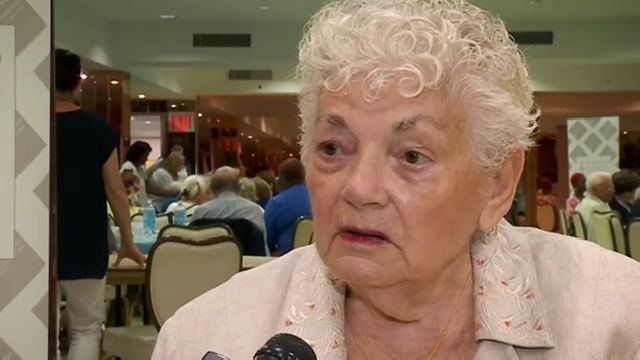New York City has more Holocaust survivors than any city in the world. The youngest Holocaust survivor is 71 years old, the oldest more than a hundred, and the average being 86. Their numbers are shrinking, but their needs are growing. Our Michael Herzenberg explains how social service organizations are stepping up to assist.
Shiela Kuper calls it her treasure wall, proudly showing photos of her three children, six grandchildren and one great grandson.
Aged 91 and a widow, she's fortunate to have help. Her home health aide Sunilda Reyes spends eight hours a day with her.
"I’m grateful but at the same token it's painful," Kuper said.
Painful, she says, because Germany pays the bills so she can remain at home.
The same country that forced her out of her home and murdered her mother, brother and sister in the Holocaust more than 70 years ago.
"I can explain it in one bitter painful word: Horror," Kuper said.
Horror that Kuper will never forget.
Like the day the Nazis rounded up the Jews in her Polish town, randomly selecting and hanging 21 of them.
"I’ll never forget it," Kuper said.
The Nazis sent her mother, little brother and sister to die in Auschwitz.
She and her father hid under the floor boards of a barn for three and a half years until the war ended.
They moved to New York where she married and raised a family.
Now living alone, Kuper doesn't know what she would do without Reyes, who cooks, cleans, takes care of her personal needs, and brings her to events like one where she can socialize with other Holocaust survivors.
This gathering is organized by Selfhelp, the agency that employs Reyes.
"Right now our survivors are getting older," said Aubrey Jacobs, Program Director of Selfhelp's Queens Holocaust Survivor Program.
An estimated 73,000 Holocaust survivors lived in the metropolitan area six years ago.
By 2025, it is projected that just 23,000 will be left.
"Although the population is shrinking the needs are growing," Jacobs noted.
As Vice President of the Claims Conference, the organization that negotiates on behalf of Holocaust survivors, Greg Schneider meets with German government officials every year.
"The need for welfare services among survivors has skyrocketed," Schneider said.
In the last decade, Germany’s spending on social services for survivors has more than doubled to nearly $400 million worldwide this year.
"People within the German government understand that this is the final time, the last opportunity to make this right," Schneider said.
He says he introduces German officials to survivors like Kuper who still suffer.
"Every night I dream I’m being chased and they run after me and they beat me and if I wake up its good because I’m myself," Kuper said.
Where she wants to be is at home but she keeps falling and breaking bones alone.
With only part-time help she needs more.
The Claims Conference will begin the next round of formal negotiations with Germany in the summer looking for more financial support for people like Kuper.





